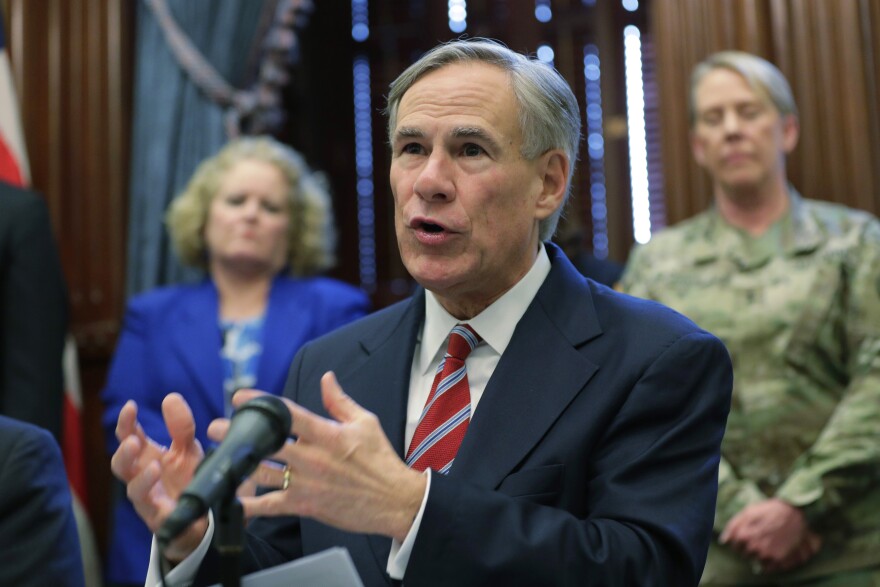Gov. Greg Abbott on Wednesday said state resources will be used to transport migrants from the Texas border to Washington D.C. under an expansion of his controversial border-security program known as Operation Lone Star.
The expansion will also include boat blockades on the Rio Grande and will direct Texas Department of Public Safety officers to increase inspections of vehicles coming into the country from Mexico.
“We are sending them to the United States Capitol where the Biden administration will more immediately be able to address the needs of people that they are allowing to come across our border,” Abbott said of the charter buses Texas will use to transport the migrants.
The governor added he plans for buses to drop off migrants at the steps of the Capitol but said in a press release after his news conference the relocation won’t be mandatory.
“To board a bus or flight, a migrant must volunteer to be transported and show documentation from DHS. Mayors and county judges can notify (the Texas Division of Emergency Management) of any DHS-facilitated drop-off of migrants in their communities so that the agency can provide appropriate transportation” the press release noted.
The announcement comes in response to President Biden’s plans to lift a pandemic-related policy that immediately expels migrants from the United States. The Biden administration announced on Friday that policy — called Title 42, which has been in place since March 2020 — will end in late May.
The vehicle inspections are an expansion of what DPS already does, said agency director Steve McCraw during a news conference at the Texas DPS headquarters in Weslaco. McCraw added the inspections won’t take place on federal land. However, Abbott conceded the new effort is likely to prolong wait times for commercial and non-commercial vehicles entering the country.
“I know in advance this is going to dramatically slow traffic from Mexico into Texas. It is a byproduct of cartels crossing the border from Mexico into Texas," Abbott said. “Cartels use vehicles, many of them dangerous commercial trucks, to smuggle immigrants, deadly fentanyl and other illegal cargo into Texas and onto our roadways."
Abbott also promised to announce more actions next week.
The increased inspections come as Mexico remains Texas’ largest trade partner. During the 2021 calendar year, more than $661 billion in two-way trade passed between the United States and Mexico, according to U.S. Census data. The lion’s share of that, about $243 billion, passed through the Laredo customs district. Ports in El Paso accounted for about $85 billion, with ports in Pharr, Eagle Pass and Brownsville also in the top 10. Texas' trade relationship with Mexico helps sustain about 1 million jobs, according to the Texas Economic Development and Tourism office.
Abbott only referenced “hordes” of immigrants that include cop killers and drug smugglers during his Wednesday news conference. But large amount of migrants apprehended along the southern border surrender to law enforcement and look to seek asylum, which is legal under current law. More than a million migrants have been turned back under the Title 42 rule since the policy’s inception.
The Biden administration’s plan to end Title 42 come as Texas continues to see more illegal crossings.
Through the first five months of the federal government’s current fiscal year, which began in October, agents in the Rio Grande Valley sector have encountered 97,253 families or single adults subject to Title 42 protocols, according to Customs and Border Protection data updated March 3.
That’s nearly 18,000 more than the next highest total of about 79,300 in the Tucson, Arizona sector. The Del Rio and El Paso sectors have also seen high numbers, at 63,851 and 57,340, respectively. (The El Paso sector includes New Mexico.)
Operation Lone Star began last year and costs state taxpayers millions of dollars every week. In addition to using National Guard troops for border security efforts, it also instructs Texas DPS officers to arrest migrants on state trespassing charges. But several state charges have been dropped due to prosecutorial errors, Texas Tribune reported. The Tribune also reported the state’s National Guard will need an additional $531 million to continue its mission through the end of the current fiscal year, which ends in August.



